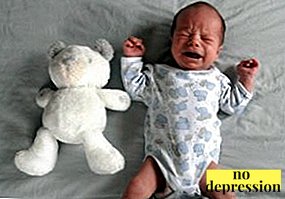The existence of genetic factors in the occurrence of schizophrenia does not cause doubts, but not in the sense of certain genes of carriers.
Schizophrenia inherited only in the case when the life course of the individual, her destiny prepares a kind of ground for the development of the disease.
Unsuccessful love, miseries of life and psycho-emotional trauma lead to the fact that a person moves away from an unbearable reality into a world of dreams and fantasies.
What is this disease?

Schizophrenia - chronic progressive disease, which includes a complex of psychoses arising due to internal causes, not associated with somatic diseases (brain tumor, alcoholism, drug addiction, encephalitis, etc.).
As a result of the disease, a pathological personality change occurs with impaired mental processes, following signs:
- The gradual loss of social contacts, leading to isolation of the patient.
- Emotional impoverishment.
- Disorders of thinking: empty barren verbosity, judgment, devoid of common sense, symbolism.
- Internal contradictions. Mental processes occurring in the mind of the patient, are divided into "his own" and external, that is, he does not belong.
TO related symptoms include the appearance of delusions, hallucinatory and illusory disorders, depressive syndrome.
The course of schizophrenia is characterized by two phases: acute and chronic. In the chronic stage, patients become apathetic: mentally and physically empty. The acute phase is characterized by a pronounced mental syndrome that includes symptom-phenomenon complex:
- ability to hear your own thoughts;
- voices, commenting on the actions of the patient;
- voice perception in the form of dialogue;
- own aspirations are carried out under external influence;
- experiencing effects on your body;
- someone takes away from the patient his thoughts;
- others can read the mind of the patient.
Schizophrenia is diagnosed when the patient has a combination of manic depressive disorders, paranoid and hallucinatory symptoms.
Who can get sick?

The disease can begin at any age, however, most often debut of schizophrenia falls on the age - 20 - 25 years.
According to statistics, the incidence is the same in men and women, but in males the disease develops much earlier, and can begin in adolescence.
In women, the disease is more acute and is expressed bright, affective symptoms.
According to statistics, the world suffer from schizophrenia 2% of the population. Unified theory of the cause of the disease today does not exist.
Congenital or acquired?
Is this a hereditary disease or not? To this day there is no single theory the occurrence of schizophrenia.
Researchers have put forward many hypotheses about the mechanism of the development of the disease, and each of them has its own evidence, however, none of these concepts fully explains the origin of the disease.
Among the many theories of schizophrenia occur:
- The role of heredity. Scientifically proven familial susceptibility to schizophrenia. However, in 20% of cases, the disease first manifests itself in a family in which the hereditary burden is not proven.
- Neurological factors. In patients with schizophrenia, various pathologies of the central nervous system were identified, caused by damage to the brain tissue by autoimmune or toxic processes in the perinatal period or in the first years of life. Interestingly, similar disorders of the central nervous system were found in the mentally healthy relatives of a patient with schizophrenia.

Thus, it is proved that schizophrenia is, predominantly genetic diseaseassociated with various neurochemical and neuroanatomical lesions of the nervous system.
However, the "activation" of the disease occurs under the influence of internal and environmental factors:
- psycho-emotional trauma;
- familial dynamic aspects: improper distribution of roles, overrepresented mother, etc .;
- cognitive impairment (impaired attention, memory);
- violation of social interaction;
Based on the foregoing, it can be concluded that schizophrenia is multifactorial disease of polygenic nature. In this case, a genetic predisposition in a particular patient is realized only through the interaction of internal and external factors.
Which gene is responsible for the disease?
A few decades ago scientists tried to identify the generesponsible for schizophrenia. The dopamine hypothesis was actively promoted, suggesting dopamine dysregulation in patients. However, this theory has been scientifically disproved.
Today, researchers tend to believe that the basis of the disease is a violation of the impulse transmission of many genes.
Inheritance - male or female line?

Argued that schizophrenia transmitted more often through the male line. These conclusions are based on the mechanisms of manifestation of the disease:
- In men, the disease manifests itself at an earlier agethan women. Sometimes the first manifestations of schizophrenia in women can begin only during menopause.
- Schizophrenia in a genetic carrier manifests itself under the influence of some kind of trigger. Men experience psycho-emotional trauma much deeper than women, which causes them more frequent development of the disease.
In fact, if the mother has a schizophrenia in the family, the children get sick 5 times more often than if the father were ill.
Statistics data on the presence of genetic susceptibility

Genetic studies have proven the role of heredity in the development of schizophrenia.
If the disease present in both parents, the risk of the disease is 50%.
If one of the parents has the disease, the probability of its occurrence in a child decreases to 5 - 10%.
Studies using twin method showed that the probability of inheritance of the disease in both identical twins is 50%, in fraternal twins - this figure drops to 13%.
By inheritance, to a greater extent, it is not schizophrenia itself that is transmitted, but a predisposition to the disease, the realization of which depends on many factors, including the trigger mechanisms.
How to find out the probability in your family?
Risk of getting sick schizophrenia in a person with an uncomplicated genetics is 1%. If one of the parents is sick in the family, then the probability of inheritance is 5 - 10%.
If the disease is manifested in the mother, then the risk of the disease increases significantly, especially in a male child.
The probability of developing the disease is 50% if both parents are sick. If there were grandparents with schizophrenia in the family, then the risk of the disease for the grandson is 5%.
In identifying the disease in siblings, the probability of schizophrenia will be - 6 - 12%.
What is the line for schizophrenia? Find out about this from the video:
How to inherit - scheme
The probability of inheriting schizophrenia from relatives depends on the degree of kinship.
Grandfather healthy | Grandmother is sick | Grandfather healthy | Grandmother healthy | |||||||
Father sick (10%) | Mother healthy | |||||||||
Brother's wife is sick | Brother (I) sick (10%) | Sister healthy (10%) | Sister's husband healthy | |||||||
Child probability of illness - 50% | Child the probability of illness is 5% | |||||||||
Burdened heredity sometimes it can manifest itself in the form of personality changes, impaired cognitive processes or manifest mild forms of the disease.
At what age can a child be diagnosed?

Schizophrenia in a child whose parents are sick can begin at any age.
Canadian psychiatrists allow children to start getting sick under 3 years old.
However, according to the results of many studies, the disease was diagnosed in children not earlier than 5 years of age.
Childhood schizophrenia expressed by the following symptoms:
- fear;
- sadness;
- depression of cognitive abilities;
- speech impairment;
- sleep and appetite disturbances;
- lag in height and weight.
Children of primary school age have disturbed communication with peers, emotional impoverishment, a state of arousal, and lethargy of impulses.
As a trigger in the development of the disease in children, many researchers have identified a violation of the relationship between mother and child and other family aspects.
Special clinical and genetic studies of families of children with schizophrenia, that in 70% of cases the parents had schizoid signs.
The psychiatrist tells about the causes of schizophrenia in children:
Is it possible to avoid?
Burdened heredity does not necessarily imply the development of the disease. Man having relatives with schizophrenia it is not necessary to fear for your health and focus on the possible development of the disease.

As preventive measures follows:
- Lead a healthy lifestyle, refuse and do not use alcoholic beverages and other drugs at all.
- Share experiences and other emotional disorders with an experienced psychologist, in order to avoid the development of apathy.
- More time to devote to the sport, to engage in active activities.
It is important to develop the right attitude towards life. You should not fall into despair in case of any problems and experience various setbacks alone. Treat problems calmly and rationally, or solve problems with a psychologist.
What to do if the diagnosis of "schizophrenia" is made during pregnancy? About this in the video:



